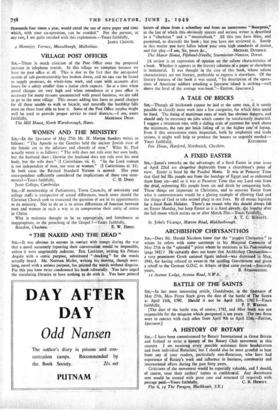"THE NAKED AND THE DEAD"
SIR,—It was obvious to anyone in contact with troops during the war that a novel accurately reporting their conversation would be impossible, unless it were unprintably indecent_ Eric Linklater, writing his Private Angelo with a comic purpose, substituted "shocking" for the words actually heard. Mr. Norman Mailer, writing his Moving, though over- long, novel with a serious purpose, has printed the words without disguise. For this you have twice condemned his book editorially. You have urged the circulating libraries to have nothing to do with it. You have printed
letters of abuse from a schoolboy and from an anonymous "Bourgeois," in the last of which this obviously sincere and serious writer is described as a "charlatan" and a "mountebank." All this you have "(Rine, and permitted, to discredit the book ; but you have not reviewed it. Surely in this matter you have fallen below your own high standards of justice, and fair play.—! am, Sir, yours &c., MICHAEL DUGDALE. The Manor House, Fifehead-Neville, Sturminster-Newton, Dorset.
[A review is an expression of opinion on the salient characteristics of a book. Whether it appears in the literary columns of a paper or elsewhere
• is immaterial. It was thought in the case of this book, Whose salient characteristics are not literary, preferable to express it elsewhere. Of the literary features of the book it was stated, "Its description of the opera- tions of American soldiers attacking a Japanese- island is striking—well above the level of the average war-book."—EorroE, Spectator.]


































 Previous page
Previous page